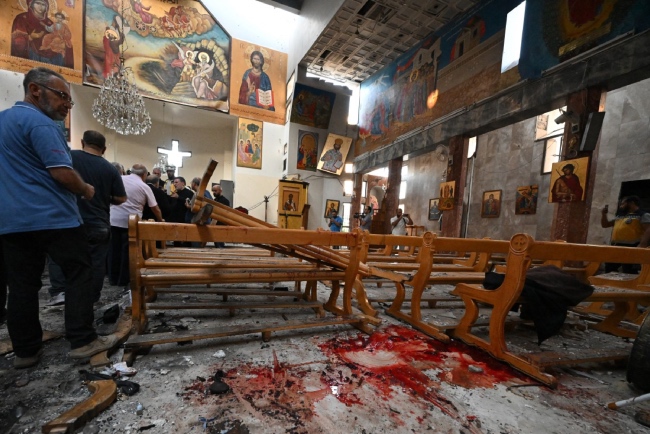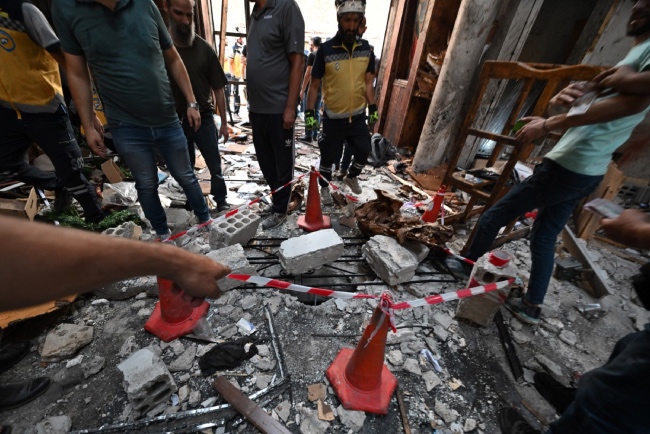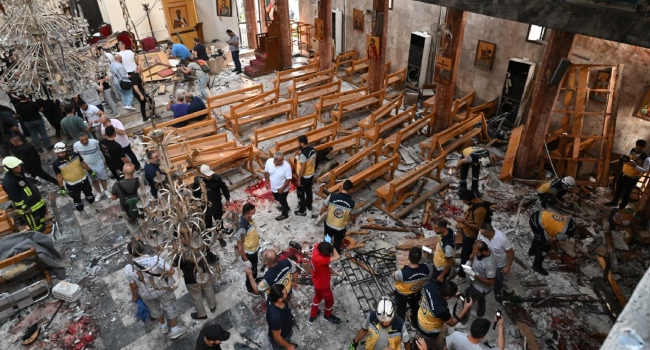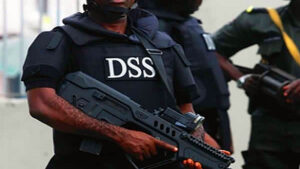Tragedy in Damascus: Suicide Bomber Kills 22 Worshippers During Church Service

A man observes bloodstains while rescue workers assess the damage following a reported suicide bombing at Saint Elias Church in Damascus’ Dwelaa district on June 22, 2025. (Photo: Louai Beshara / AFP)
By Sholeye Ayodele, Lagos
A shooting and suicide bombing during a packed Sunday service at a church in Damascus left at least 22 people dead, with authorities identifying the attacker as a member of the Islamic State (IS) group. The international community widely condemned the incident, which marked the first attack of its kind in the Syrian capital since Islamist forces toppled former President Bashar al-Assad in December.
Monitoring groups confirmed this was the first attack to occur inside a church since the Syrian civil war began in 2011. Security remains a major challenge for the new Syrian authorities, with continued international calls to protect religious and ethnic minorities.
AFP correspondents at the scene reported that emergency workers were evacuating victims from the Orthodox church, while security personnel cordoned off the area. The church interior was left in ruins, with shattered pews, damaged icons, and blood on the floor.
According to a statement from the interior ministry, a suicide attacker affiliated with the IS group entered the Saint Elias Church in the Dwelaa district, opened fire, and then detonated an explosive belt. The state news agency, citing the health ministry, reported 22 deaths and 63 injuries.

A worshipper, Lawrence Maamari, told AFP that the attacker began shooting after entering the church, and people attempted to stop him before he detonated the bomb. Another witness, Ziad Helou, who was nearby at the time, described hearing gunfire and an explosion followed by a fire and broken glass. He said the force of the blast scattered the wooden benches across the church entrance.
Eyewitnesses described scenes of panic, especially among children and elderly worshippers, as families continued to search for missing loved ones. The Syrian Observatory for Human Rights noted this was the first suicide bombing inside a church since the start of the conflict, though other churches had been damaged or attacked in surrounding areas.
The Orthodox Patriarchate in Damascus called on the authorities to take full responsibility for the incident and to safeguard the sanctity of religious institutions while ensuring the safety of all citizens.
Syria’s Christian population has dramatically declined from around one million before the war to fewer than 300,000, due to ongoing displacement and emigration. The UN Special Envoy for Syria, Geir Pedersen, condemned the attack and called for a thorough investigation.
The U.S. special envoy, Tom Barrack, expressed support for Syria in combating forces that promote fear and instability. Turkey, which maintains close ties with Syria’s current leadership, voiced confidence in the unity of Syrians against terrorist threats. France reiterated its commitment to a Syrian political transition that promotes peace, pluralism, and sovereignty for all citizens regardless of religion. Egypt’s Al-Azhar institution condemned the attack as a blatant violation of the right to life and worship.
Syria’s foreign ministry described the bombing as an attempt to undermine national coexistence and destabilize the country. Former President Assad had long positioned himself as a defender of minorities, who frequently came under attack during the war, often from jihadist factions such as IS.

Since the shift in leadership, the international community has pressed the new Syrian authorities to guarantee minority rights and ensure inclusive governance, particularly in light of rising sectarian violence.
Interior Minister Anas Khattab announced that investigations had begun and affirmed that such terrorist acts would not derail Syria’s pursuit of civil peace. In a previous interview, Khattab stated that IS had shifted its tactics towards calculated attacks on key targets, including planned assaults against Christian and Shiite communities, some of which were reportedly thwarted.
Last month, IS claimed its first attack on the new Syrian government forces. Authorities responded by arresting members of an IS cell near Damascus, accusing them of plotting further attacks.
IS once controlled large areas across Syria and Iraq and declared a cross-border “caliphate” in 2014, before its territorial defeat in 2019.





